Every so often, and it’s not as often as you might think, a book comes along with an inspired premise so out there and yet so of its time, that you marvel at how someone managed to come up with such an original and insightful idea, one that casts a whole new light on an issue that has already been covered comprehensively in so many other ways.
The issue, in this instance, is the terrible toll humanity is taking on this planet, primarily that of climate change and its attendant environmental and societal consequences and the author is the breathtakingly clever take on the issue is Rebecca Bowyer, a Melbourne, Australia-based author who brings an immense amount of affecting humanity to the exploration of the subject at hand, transforming it as she does so from an idea that is somehow removed from our day-to-day life to one that is very much up in our collective face.
In Stealing Time, Bowyer shows how an Australia not too far removed from the present day deals with a world in which resources are depleting scarily quickly so much so that coffee is a rarity, meat is a luxury good (because of the way in which animals contribute to climate change) and people are living too long and consuming scarce commodities by inserting a chip into someone’s neck at birth that automatically terminates their life at 65.
That is, of course, assuming they live that long; for the rich, cossetted as always from the worst excesses of humanity’s careless exploitation of one very finite planet, getting to that ripe old age is easy but for the poor and middle class, it involves working huge amounts of overtime, and having children (one child per couple is the rule) in order to secure extra time credits.
“She didn’t want to think about those dark times when children couldn’t be let out of their parent’s sight for even a second. She shuddered at the memory of children suddenly reappearing on the doorsteps of frantic households. The footage of joyful reunions shattered just seconds later as the child collapsed in their parent’s arms–the years, weeks and minutes stripped away from them.” (P. 8)
Time is a hot commodity as a result.
The rich buy it off the grid, taking time tabs that grant them four extra hours in the day by freeze framing them where they are (the poor, as always, are left to fend for themselves as the chronological have-nots) and which allows them to get more done in a life where the clock is always thundering down to their long ago appointed oblivion.
If it sounds barbaric, in many ways it is, and Stealing Time doesn’t shy away from the fact that this kind of Logan’s Run-type approach to brutally shepherding humanity to some sort of workable future isn’t without some considerable ethical and moral dilemmas; even so, many of the characters accept that this is the way it has to be if people are to stick around in some way in a world that is increasingly unable to sustain them.
As you might imagine, in a world where time is at a premium, there are those who want to find ways to subvert and steal time for their own hideously selfish ends, and they do so by stealing children from schools and off the streets to drain their chips of all the time they have between childhood and the age of 65, before returning them with just enough time to say goodbye to their traumatised parents.
(This is not the first this has happened, making Varya’s distress and guilt all the more pronounced; deals with her guilt about inventing and failing to fully destroy such a dangerous technology by running the Minor Miracles Foundation which, funded by an illicit trade in time tabs sold by employee and friend Marisa Volkov, finds cures for a host of paediatric diseases. )
It’s dark and troubling response to the mandated lifespan strictures, and protagonist Dr Varya Galanos, a fourth-dimension physicist who developed the initial time technology a decade before, has to work hard to find a way to stop these thieves in their unscrupulous tracks.
Adding an extra dimension to this struggle, which rather fittingly has to race against the clock to find answers as the number of kidnapped kids increase, is that one of the kids who disappears is the son of her best friend Zoe, someone with whom she has grown quite close after some family tragedy sent her searching for some form of replacement familial closeness.
This personal angle infuses Stealing Time with a rich, deeply moving humanity; there is lot more on the line for Varya than the disappearance of the children and misuse of the stolen time tech, terrible though they both are, and failure to fix what she believes she has broken carries a huge amount of cost to not only her but those she loves.
The idea of time chips and trafficking in time might seem far fetched but Bowyer makes them feel real and immediate, as plausible as anything else in our increasingly complicated world where survival is becoming ever more precarious and uncertain and where some very tough decisions are in the offing.
Stealing Time makes a wholistic macro issue, one that can feel remote despite all the talk of greater number of bushfires and floods and the need to recycle and conserve dwindling resources, feel very micro indeed.
“Daniel stared at her as realisation dawned. Vary hadn’t told Elena about the time thieves. Elena must think he had cancer or something … He opened his mouth to explain to her. Maybe Varya just hadn’t had the time. But the moment had passed, and now she was saying something about Sonic the Hedgehog and arcade games, back in her own childhood. He peered over his shoulder and down the hallway, hoping his mum would return soon.” (P. 186)
Bowyer’s second novel, which follows on the heels of Maternal Instinct, is that rare Big Ideas dystopian novel that delivers on the humanity which is at the centre of any story involving the future.
Like it or not, we are the dominant species on the planet and what we do has immense effects on what happens to good old planet earth, but then so does anything we do to alleviate the deleterious consequences of us playing the planet’s ever diminishing resources sandbox.
It’s a lot to take in and deal with, but Bowyer makes grappling with the overwhelming horrors of a dystopian future fast rushing up to meet us, far easier to get our heads around by making it very real, very personal; after all, who among us wouldn’t find dying at 65 at the clock counts down to our birthday confronting, who wouldn’t fret for their parents or kids in a world where this happens and who wouldn’t mourn for life as it once was as one by one things that we counted on start to disappear from our lives.
Stealing Time combines an energising action thriller with a host of compelling ethical and moral issues, all of which are given their due macro importance but more importantly for the accessibility of some big and meaty issues and, in this most immersively brilliant of novels, a story which never forgets that people are its centre and are affected by anything in ways massive and profound, and small and bitingly personal.
Life is undoubtedly going to get darker before it hopefully gets better but on the way to a possible happy ever after (which is not even remotely guaranteed), Bowyer presents us with a future full of troubling but necessary decisions, humanity’s best and worst aspects and a minefield of issues to navigate in a novel which is expansively big and thrilling but also compellingly intimately human and affectingly, winningly personal.

